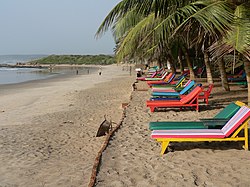Central Region | |
|---|---|
 | |
 Location of Central Region in Ghana | |
| Country | Ghana |
| Capital | Cape Coast |
| Districts | 17 |
| Government | |
| • Regional Minister | Ekow Panyin Okyere Eduamoah [1] |
| Area | |
• Total | 9,826 km2 (3,794 sq mi) |
| • Rank | Ranked 8th |
| Population (2021 Census) | |
• Total | 2,859,821 |
| • Rank | Ranked 4th |
| • Density | 291.0/km2 (753.8/sq mi) |
| GDP (PPP) | |
| • Year | 2013 |
| • Per capita | $5,150 |
| GDP (Nominal) | |
| • Year | 2013 |
| • Per capita | $3,500 |
| Time zone | GMT |
| Area code | 033 |
| ISO 3166 code | GH-CP |
| HDI (2017) | 0.633 [2] medium · 5th |
The Central Region is one of the sixteen administrative regions of Ghana. Ashanti and Eastern regions border it to the north, Western region to the west, Greater Accra region to the east, and the Gulf of Guinea to the south. The Central Region is renowned for its many elite high schools and an economy based on an abundance of industrial minerals and tourism. The Central region has tourist attractions including castles, forts and beaches along the region's coastline.





